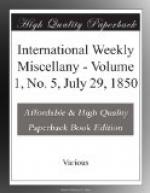“’This morning, on looking over your marriage settlement, Mr. Sly is of opinion that, if Mrs. Hamilton will renounce certain rights he can raise the money at once, and that too only at legal interest, say six per cent.—’”
Often had I witnessed a paternal explosion; but, when it was hinted that the marital rights of my poor mother were to be sacrificed, his fury amounted almost to madness.
“Damnation!” he exclaimed; “confusion light upon the letter and the letter-writer! You!—do you an act to invalidate your settlement! I would see first every canting vagabond in——” and he named a disagreeable locality. “Never, Mary! pitch that paper away: I dread that at the end of it the old lunatic will inflict her benediction. Frank, pack your traps—you must catch the mail to-night; you’ll be in town by eight o’clock to-morrow morning. Be at Sly’s office at nine. D——n the gout!—I should have done the job myself. Beat the scoundrel as nearly to death as you think you can conscientiously go without committing absolute murder: next, pay a morning visit to Kettlewell, and, if you leave him in a condition to mount the pulpit for a month, I’ll never acknowledge you. Break that other seal; Probably, the contents may prove as agreeable as old Kitty’s.”
There were times and moods when, in Byron’s language, it was judicious to reply “Psha! to hear is to obey,” and this was such a period. I broke the black wax, and the epistle proved to be from the very gentleman whom I was to be dispatched per mail to qualify next morning for surgical assistance.
“Out with it!” roared my father, as I unclosed the foldings of the paper; “What is the signature? I remember that my uncle Hector always looked at the name attached to a letter when he unclosed the post-bag; and if the handwriting looked like an attorney’s he flung it, without reading a line, into the fire.”
“This letter, sir, is subscribed ‘Selby Sly.’”
“Don’t burn it, Frank, read. Well, there is one comfort that Selby Sly shall have to-morrow evening a collection of aching ribs, if the Hamiltons are not degenerated: read, man,” and, as usual, there was a running comment on the text.
“’Dublin,—March, 1818.
“’Colonel Hamilton,—Sir,
“‘It is my melancholy duty to inform you—’”
“That you have foreclosed the mortgage. Frank, if you don’t break a bone or two, I’ll never acknowledge you again.”
“’That my honored and valued client and patroness, Mrs. Catharine O’Gorman, suddenly departed this life at half-past six o’clock, P.M., yesterday evening, when drinking a glass of sherry, and holding sweet and spiritual converse with the Reverend Carter Kettlewell.’”
“It’s all up, no doubt: the canting scoundrels have secured her—or, as blackguard gamblers say, have ‘made all’ safe?”
“’She has died intestate, although a deed, that would have immortalized her memory, was engrossed, and ready for signature. Within an hour after she went to receive her reward—’”




